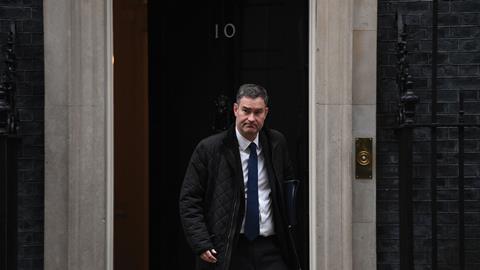
So farewell, then, David Gauke. The lord chancellor made it clear in a speech to judges this month that he would not serve in a government led by Boris Johnson. Jeremy Hunt’s apparent willingness to contemplate a no-deal Brexit ruled him out too.
Not that Gauke mentioned either potential prime minister by name. Instead, there was gallows humour about how, having been appointed in January last year, he was the first lord chancellor in a while who had lasted long enough to address the lord mayor’s annual dinner twice.
‘It is true that my predecessor-but-two, Michael Gove, made it to his second speech,’ the justice secretary added. ‘But he left the government one week later when a new prime minister, with whom he did not see eye to eye, took office (pause). How times have changed (pause for laughter). I might have three weeks.’
Gauke’s speech received a rare standing ovation from judges and City dignitaries. Earlier, the lord chief justice had thanked him for the personal effort he had put into dealing with the judges’ pension problems.
Like so many of Gauke’s challenges, these date back to his predecessor Chris Grayling, who introduced a new judicial pension scheme in 2015 which was registered for tax. That made it much less valuable to the judges and, as the Review Body on Senior Salaries pointed out last year, it had a damaging effect on judicial morale. The scheme also turned out to be unlawful because it discriminated against younger judges – though this finding did not become incontrovertible until last month, when the Supreme Court refused the government permission to appeal.
By then, Gauke had mitigated the worst effects of Grayling’s reforms by persuading the Treasury to grant a temporary allowance of 25% to High Court judges affected by the new pension scheme; judges lower down the hierarchy received 15%.
The effect of this is best explained through the example of a High Court judge born in 1961 and appointed in 2008. A judge in that position faced a tax bill of £26,000 as a result of the pension changes. The new recruitment and retention allowance was worth £25,000, leaving the judge no more than £1,000 out of pocket. In due course, that judge can expect to forego the £25,000 and join the old pension scheme.
Gauke hopes that by resigning from the government rather than signing up to a no-deal Brexit he will be well placed to return whenever that policy is off the political agenda
But this is more about mood than money. Gauke recognised recruiting and retaining a high-quality judiciary was fundamental. His predecessor Liz Truss had failed to defend judges against a notorious newspaper attack after the High Court had ruled in 2016 that Brexit could not be triggered without legislation.
Addressing judges at the Mansion House, Gauke deprecated the ‘rise of the simplifiers’ – people who misused language to undermine institutions such as the judiciary. ‘Those grappling with complex problems are not viewed [by the simplifiers] as public servants but as engaged in a conspiracy to seek to frustrate the will of the public. They are “enemies of the people”,’ he said. ‘In deploying this sort of language, we go to war with truth; we pour poison into our national conversation.’
In what were clearly valedictory remarks, the lord chancellor reminded judges of his efforts to reform prisons and probation. He deserves credit for these – although there is still a long way to go. There was nothing in the speech about legal aid, a problem Gauke has been unable to resolve. And there was no mention of his biggest misjudgement: demanding the resignation of Nick Hardwick as chair of the Parole Board after it had decided that the sex offender John Worboys could be safely released. That was unwise and perhaps even unlawful.
Shrewdly, though, Gauke realised that Brexit, far from overwhelming parliament this summer, could actually leave MPs and peers with time on their hands. After officials were instructed to prepare bills that could fill the legislative gap, Gauke introduced three important measures. The Sentencing (Pre-consolidation Amendments) Bill may not set pulses racing but it will pave the way for a code that will simplify sentencing and save £250m over 10 years. The Courts and Tribunals (Online Procedure) Bill ran into some difficulty in the Lords – the government hopes to overturn a well-meaning but unwanted amendment – but it should speed up the introduction of simplified court proceedings. Most far-reaching of all is the Divorce, Dissolution and Separation Bill, discussed here two weeks ago, which is on its way to the House of Lords.
Gauke, by contrast, hopes that by resigning from the government rather than signing up to a no-deal Brexit he will be well placed to return whenever that policy is off the political agenda. In the meantime, judges are wondering whether his successor will still be in post to address the judges when they gather again at the Mansion House next July.
Joshua Rozenberg is the keynote speaker at the Small Firms Division annual conferences. For more information and to book your place click here.
































4 Readers' comments